Traditional celebrations are a huge part of Greek culture. This article highlights the most important national holidays, cultural events, religious festivals and other special days in Greece.
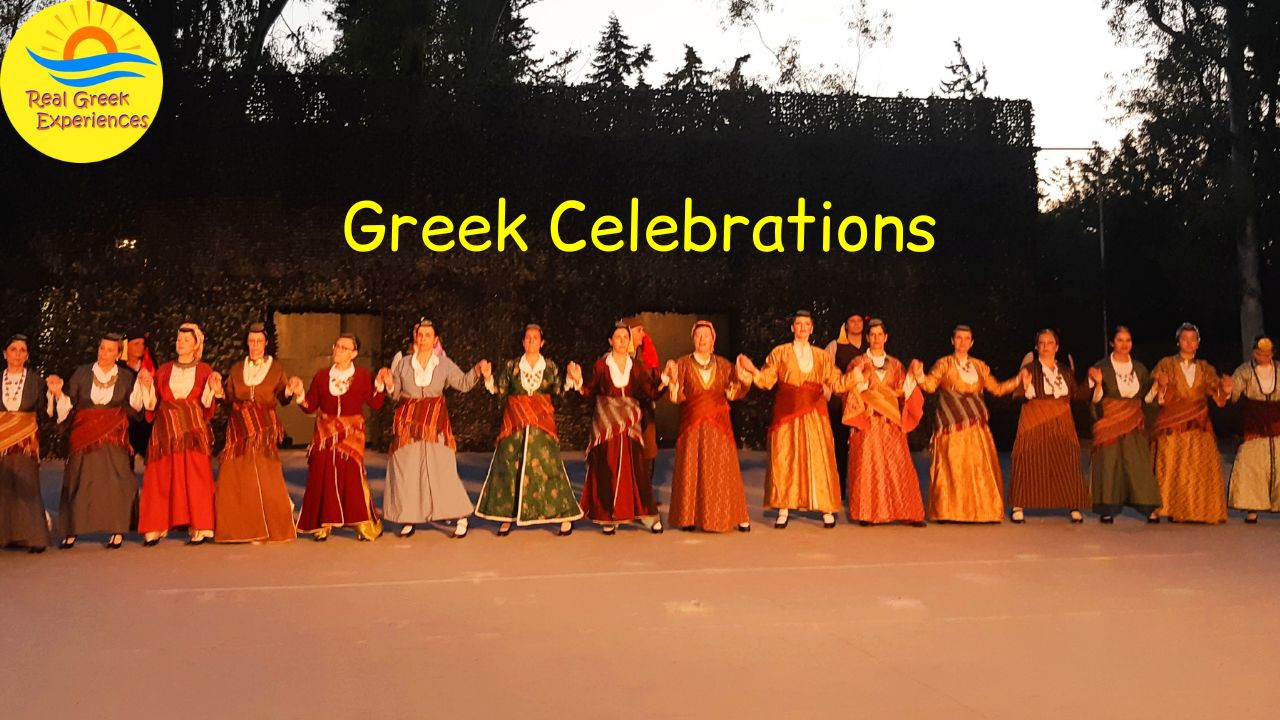
Celebrations and festivals in Greece
Visitors are often surprised by the number of public holidays in Greece. It’s true – Greeks celebrate various and religious or cultural festivals throughout the year.
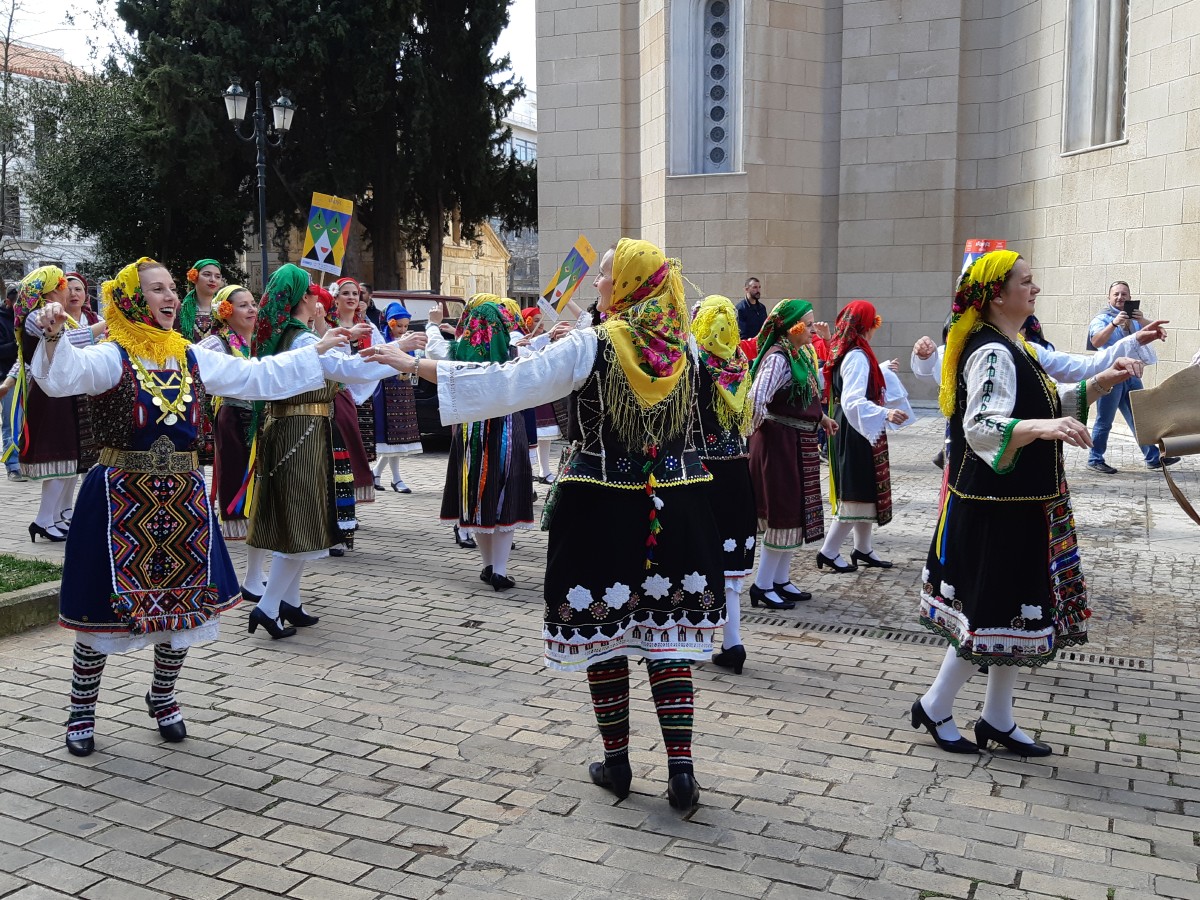
Some of them, like Greek Easter and Christmas, are tied to Greek religion. Others, like the Carnival, the Greek Independence Day, and the Oxi Day, go hand in hand with tradition, customs and history.
Let’s explore the most important festivals and national holidays in Greece.
1 January – New Year’s Day
New Year’s Day is a big celebration in many parts of the world. The Greek word, Protohronia, literally means “the first (day) of the year”.
On this day, people in Greece cut a special cake, called vasilopita, where a coin has been hidden. The person who gets the piece with the coin gets good luck for the whole year!

As for New Year’s Eve, Greeks usually celebrate with family and friends. Long dinners, card games but also bar-hopping or clubbing are all common ways to celebrate the New Year.
On New Year’s Eve, it is customary for children and teenagers to go around their neighborhood and sing the New Year’s Carols.
New Year’s Day is a national holiday in Greece, so archaeological sites, museums and shops remain closed. It’s an interesting day to walk around central Athens and enjoy the peace and quiet!
6 January – Epiphany
Epiphany is the day when the Greek Orthodox church celebrates the baptism of Jesus Christ by John the Baptist.
In Greek, Epiphany is called Theofania or Fota, and is celebrated in a very unique way. Priests everywhere in Greece throw a cross in the sea, and people dive in the cold water to retrieve it.

Traditionally, it was mostly young men diving for the cross. These days you might see men and women of all ages, and finding the cross is considered a special privilege.
On Epiphany, sites and museums are open, but stores remain closed.
February / March: The Carnival
One of my favourite Greece festivals is the Greek Carnival, or Apokries in Greek. Unlike other carnivals, it’s not very well-known outside Greece, yet it’s a fantastic time of the year to be here.
During the Greek carnival, people dress up in various colourful costumes – funny, quirky, sexy, dark or scary. While this is an important event for children, you will see people of all ages dressing up, often in very elaborate costumes and makeup.

The most famous Carnival celebrations in Greece are held in Patras, the largest city in the Peloponnese, and Xanthi, a town in Northern Greece. There are big Carnival parades, parties, an all-over merry atmosphere and lots of drinking and dancing on the streets.
Incidentally, the Carnival has its roots back in Ancient Greece. It is quite similar to a multi-day wine festival that the Ancient Greeks held in the honour of God Dionysus, the God of Greek theater and drunkenness.
The exact dates of the Carnival change every year. The Carnival season begins ten weeks before Easter Sunday, and lasts for three weeks. In 2026, the Greek Carnival celebrations will run between 1 and 23 February.
You could argue that Apokries is the Greek equivalent to Halloween. This probably explains why Halloween in Greece is not really a big thing.
February – Tsiknopempti – Grilled Meat Thursday
Twelve days into the Carnival season, there is a special day when it is customary to eat lots of meat. In Greek, this is called Tsiknopempti, which is close to “grilled meat Thursday”. Pempti is Thursday, and the word tsikna literally means “the smell of grilled meat”!

On this day, you will typically see many Greeks eating out at restaurants and grill houses. It’s a good opportunity to meet friends and eat and drink like there’s no tomorrow.
In 2026, Tsiknopempti falls on 12 February. Meat lovers rejoice!
February – All Souls’ Day – Psihosavvato
The celebration known in Greek as Psihosavvato is a memorial day where the Orthodox Church commemorates the deceased, like the All Saints Day and All Souls’ Day in the United States. The word Psihosavvato literally means “Soul Saturday”, or “Saturday of the Souls”.
The concept of Psihosavvato is very similar to the Día de los Muertos, or Day of the Dead. However, unlike Mexico Sity, it’s not really a feast day, and there’s no face painting or parading involved. Instead, this is a solemn religious celebration, which happens only at the church.
The first Psihosavvato of the year is two days after Tsiknopempti. There’s also a second Psihosavvato which is usually in June.
It’s worth noting that Greeks have several memorial services during the year following someone’s death, and all of them are on set dates. This is different from the Roman Catholic church, where there are no prescribed mourning periods for deceased family members.
6 March – Melina Mercouri day
This day, which often flies under the radar, is a tribute to the Greek actress and former Ministry of Culture, Melina Mercouri. This is a great opportunity to visit any of the archaeological sites and public museums in Greece, as they all offer free entrance.
Read more here: Acropolis and six more ancient sites in Athens
February / March – Clean Monday
Right after the Carnival season, Greeks celebrate a special day, called Kathara Deftera, or Clean Monday. This day is the first day of Lent, the seven-week period before Easter, and it’s an official public holiday in Greece.

On Clean Monday, Greeks traditionally fly kites and eat special Lent dishes called nistisima, based on vegetables, legumes and seafood.
Here is some more information about Clean Monday. In 2026, it will be celebrated on the 23rd February.
25 March – Greek Independence Day
25 March is the Greek Independence Day, the anniversary of the Greek War against the Ottoman Empire, which began on 25 March 1821. It is celebrated with student and military parades all around Greece and the Greek islands. You’ll see Greek flags everywhere!

Apart from being an important day in Greek history, the 25th of March coincides with a religious celebration, the Annunciation to the Virgin. This was when Angel Gabriel announced to Virgin Mary that she would give birth to a son, who would be called Jesus Christ.
Archaeological sites, museums and all stores remain closed on Independence Day.
If you are in Athens, it’s a great opportunity to stroll around the city and watch the military parades. Or you can visit the Acropolis museum which remains open, with free entrance.
If you like fried fish, look out for the traditional dish of the day, battered cod with skordalia, a thick garlic sauce.
18 April – World Heritage Day
The 18th April is the World Heritage Day, otherwise known as the International Day for Monuments and Sites. This anniversary was established by UNESCO and aims to introduce the world’s most important monuments to the public.
The archaeological sites and museums offer free entrance. It’s a great time to visit sites like the Acropolis, the Ancient Agora or Ancient Delphi, as there will be many spring flowers and few tourists.
April / May – Holy Week and Easter Sunday
Greek Orthodox Easter, or Pasha, is the most important religious festival in the Greek Calendar. Visiting during that time is a rewarding cultural experience, as Easter celebrations around the country are unique.
Throughout the Holy Week, people attend various masses at the Greek Orthodox church. On Holy Thursday, there is a re-enactment of the Crucifixion, whereas on Good Friday there are Epitafios processions all around Greece, symbolizing Jesus’s death.
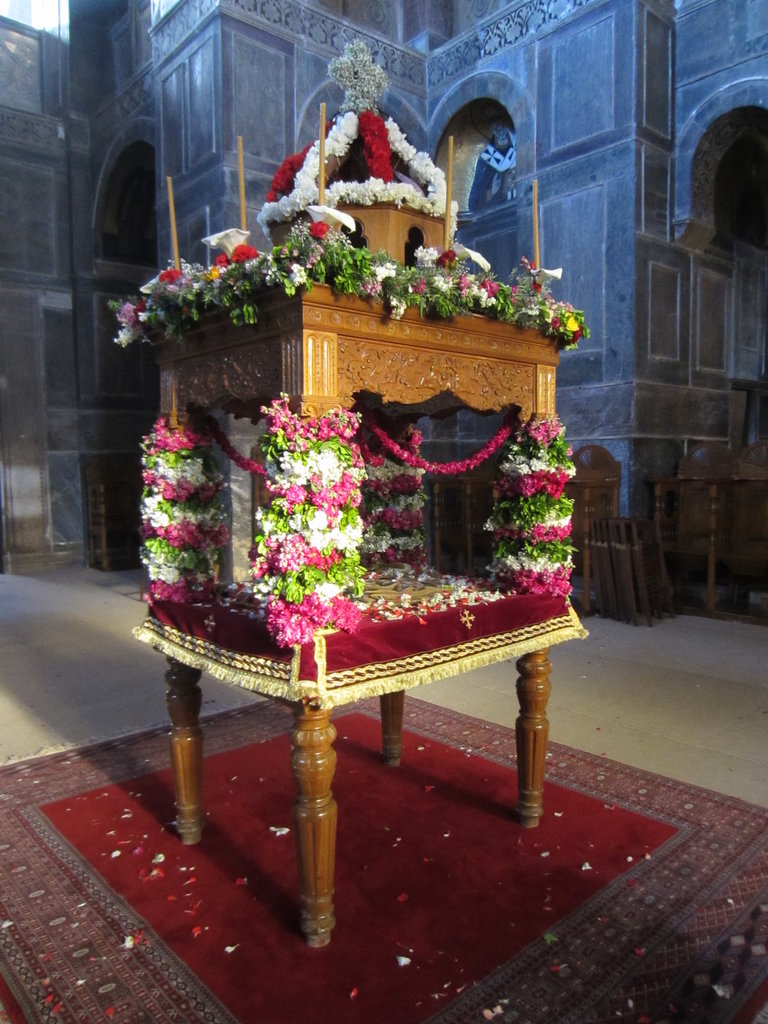
The biggest event during the Holy Week is the Resurrection of Jesus, which happens at midnight on Good Saturday. Church bells everywhere in Greece ring in celebration, and everybody greets each other with the traditional phrase Christos Anesti (Christ has Risen).
On Easter Sunday, Greek families gather together to feast on specially prepared Easter meal, like lamb on the spit and red eggs. Make sure you try the tsoureki, a type of traditional sweet bread.
Ancient sites and museums remain closed on Easter Sunday. Opening hours on Holy Friday and Holy Saturday are usually shorter, so check in advance of your visit.
In 2026, Greek Easter is on the 12th of April. Here is more information on Greek Easter celebrations, food and customs.
1 May – Labor Day
The 1st of May, or Labor Day, is a strike day in some countries. In Greece, it has been classified as a public holiday in the past few years, and is known as Protomagia.
On this day, there are typically some marches and demonstrations in central Athens. Many people choose to visit the countryside and pick a few flowers, or go to the beach.

On this day, sites, museums and stores remain closed. All ferries and most public means of transportation, like the Athens metro, may not be running, so it’s best to avoid all travel.
Here is some more information on strikes in Greece, and what to do in Athens on May Day.
18 May – International Museums Day
This is another day when entrance to sites and museums is free. This includes most private museums, so it’s a good opportunity to head to places like the various Benaki Museum buildings in Athens.
May / June – Day of the Holy Spirit
Seven weeks after Easter Sunday on the Orthodox Calendar, the church celebrates Pentecost Sunday. This is a commemoration of the day the Holy Spirit descended upon the Apostles.
The Monday after the Pentecost is the Day of the Holy Spirit, known also as Whit Monday, or Agiou Pnevmatos in Greek. This is a public holiday for schools and office workers, though stores, sites and museums operate as normal.
In 2026, the Holy Spirit Monday falls on the 1st of June, and it’s a good opportunity for a long weekend. If you are travelling by ferry over those days, it’s best to book your ferry tickets in advance.
15 August – Dormition of Virgin Mary
One of the most important holidays in Greece is the 15th of August, when Greek Orthodoxy commemorates the Dormition of the Mother of God.
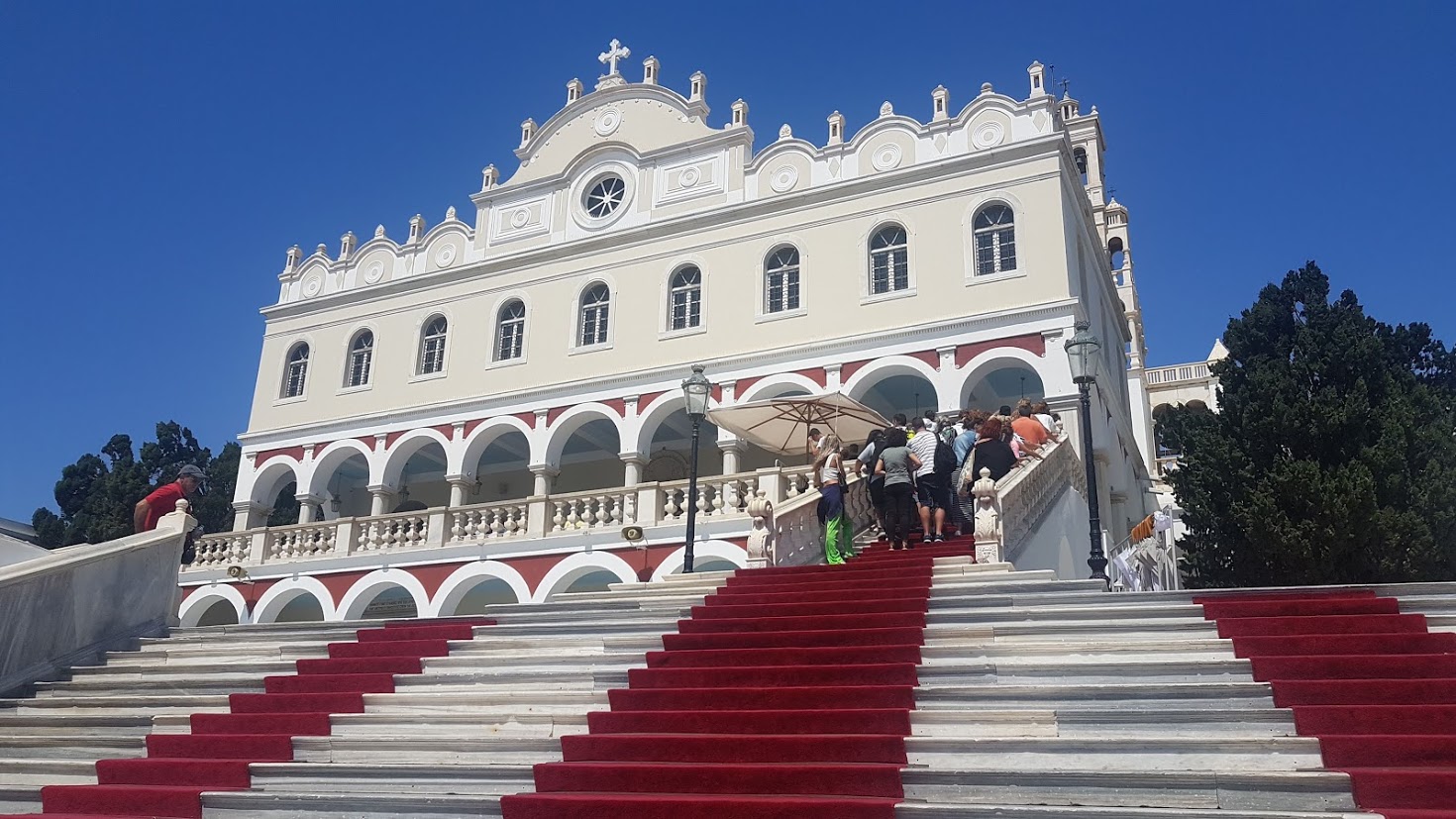
Hundreds of churches all around Greece celebrate with masses. These are typically accompanied by other events and festivities, such as live music and dancing, known in Greek as panigiria.
One of the most popular churches to visit on this day is the Panagia Evangelistria church in Tinos island, but everywhere you go there is bound to be a religious ceremony and a panigiri.
Panigiria in Greece – A huge part of Greek tradition
Apart from the religious feasts on 15th August, many more panigiria happen in Greece throughout the year, celebrating the area’s patron saint. This is what we call namedays in Greece.
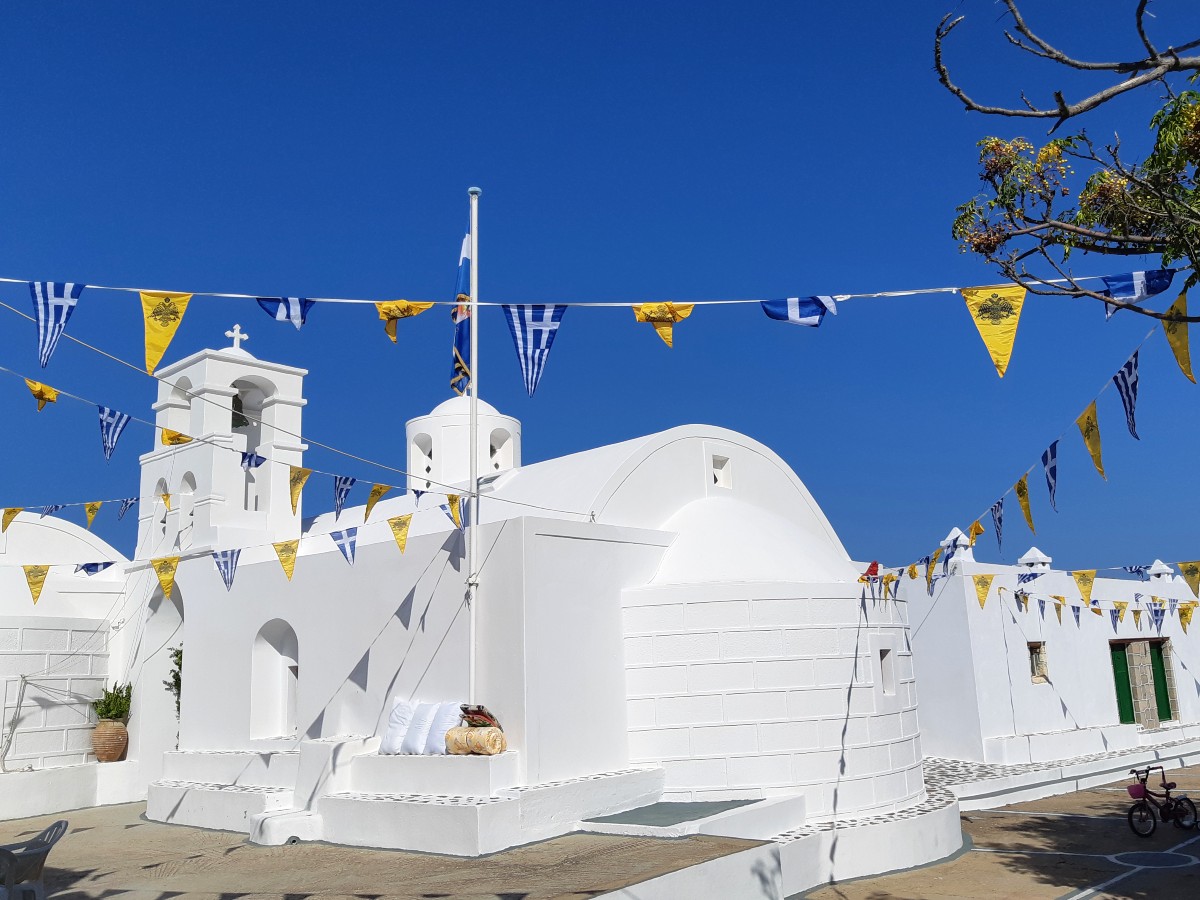
Some important dates to watch out for are:
- 23 April – Saint George
- 21 May – Saint Constantine, Saint Helen
- 24 June – Saint John
- 29 / 30 June – Saint Peter and Saint Paul, the Holy Apostles
- 17 July – Agia Marina
- 20 July – Prophet Ilias
- 26 July – Agia Paraskevi
- 27 July – Saint Panteleimon
- 23 August – Virgin Mary
- 29 August – Saint John
So, when you are on your Greek holidays, ask around – you might discover a traditional panigiri close to where you are.
Last weekend of September – European Heritage Days
On the last weekend of September, Greece celebrates the European Heritage Days. Visitors can enjoy free entrance to all the ancient sites and public museums in the country.
28 October – The “OXI” day
Another important holiday in Greece is the so-called OXI day. On 28 October 1940, Prime Minister Ioannis Metaxas declined an ultimatum by the Italian dictator Benito Mussolini, resulting in Greece’s involvement in World War II.
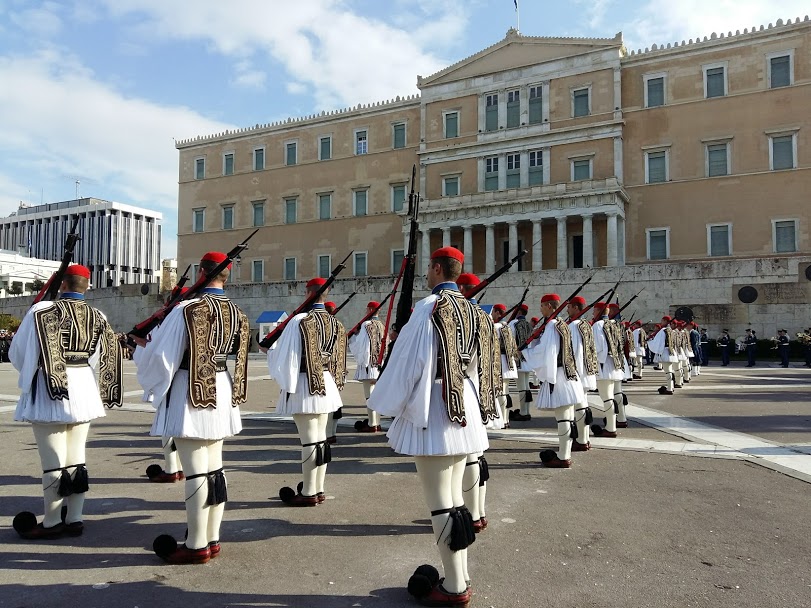
The OXI day is one of the official Greek public holidays, and it’s another day celebrated with military and student parades all around Greece. The biggest parade happens in Thessaloniki.
Stores remain closed, whereas sites and public museums operate with free entrance. This is a day when the Acropolis normally gets very crowded!
Here is some more information about the OXI day in Greece.
17 November – The anniversary of the Polytechnic Uprising
Another significant day in Greece is the anniversary of the Athens Polytechnic Uprising.
On 17 November 1973, there was a big student demonstration which started at the Polytechnic school in Exarchia area in Athens. Students revolted against the Greek military dictatorship that ruled the country between 1967 and 1974.
The uprising ended in a tank breaking down the gates of the Polytechnic School, and several people being killed – though, to this day, there seems to be no clear consensus on numbers. The Uprising event was the beginning of the end of the junta regime in Greece.
On 17 November, marches and demonstrations happen in Athens, Thessaloniki and many other cities in Greece, often ending in a heated atmosphere and riots. If you would prefer to give them a miss, avoid central areas like Exarchia, Patission and Panepistimiou streets in Athens.
Here is a guide to the areas where demonstrations happen, including a map – 17 November protests in Athens.
25 / 26 December – Christmas Day and Boxing Day
The last holiday of the year, and one of the most important religious celebrations in Greece, is Christmas Day, or Christougenna.
Greek tradition calls for families spending time together, and it’s an overall quiet day, mostly spent at home. Some of the special desserts prepared for the festive season are sweet biscuits named melomakarona and kourambiedes.

On Christmas Eve, it is common for young locals to go around neighbourhoods, knock on the doors, and sing Christmas carols.
If you are visiting Greece during that period, you should know that archaeological sites, museums and shops remain closed on both Christmas Day and Boxing Day.

This is a fun time to explore the various neighbourhoods in Athens, like Syntagma Square, Plaka and Psiri, and take photos of seasonal decorations and Christmas trees.
Here’s a guide on Christmas in Greece, including the best things to do in Athens!
FAQs about celebrations and festivals in Greece
Here are some questions often asked by visitors:
What are some traditional celebrations in Greece?
Some of the best known traditional celebrations in Greece include Greek Easter, Christmas, the Dormition of the Virgin, the Independence Day, the OXI day, and the Carnival.
How many national holidays are there in Greece?
The official Greek national holidays are New Year’s Day, Epiphany, Clean Monday, Independence Day, Good Friday, Greek Easter Sunday and Monday, Labor Day, Dormition of the Virgin, OXI day, Christmas Day and Boxing Day. For some businesses, the Day of Holy Spirit is also a holiday.
What is the most famous festival in Greece?
The most famous religious festival in Greece is Greek Orthodox Easter, an important celebration with unique local customs.
Is the Greek Calendar the same with the Catholic and Protestant calendars?
The Greek Orthodox Calendar is different to the Catholic and Protestant calendars. This is why Greek Orthodox Easter usually falls on a different day than Catholic and Protestant Easter.
What was considered a huge festival in ancient Greece?
The most important festival in ancient Greece were the Olympic Games, which happened every four years. Wars and battles were called off for the duration of the Games.
Here is some an article about the origins of the Olympic Games in Ancient Greece.
More information about Greek culture
So there you go – these are the most important festivals and celebrations in Greece. Here’s a handy calendar with Bank Holidays Greece 2026 that you can Pin!
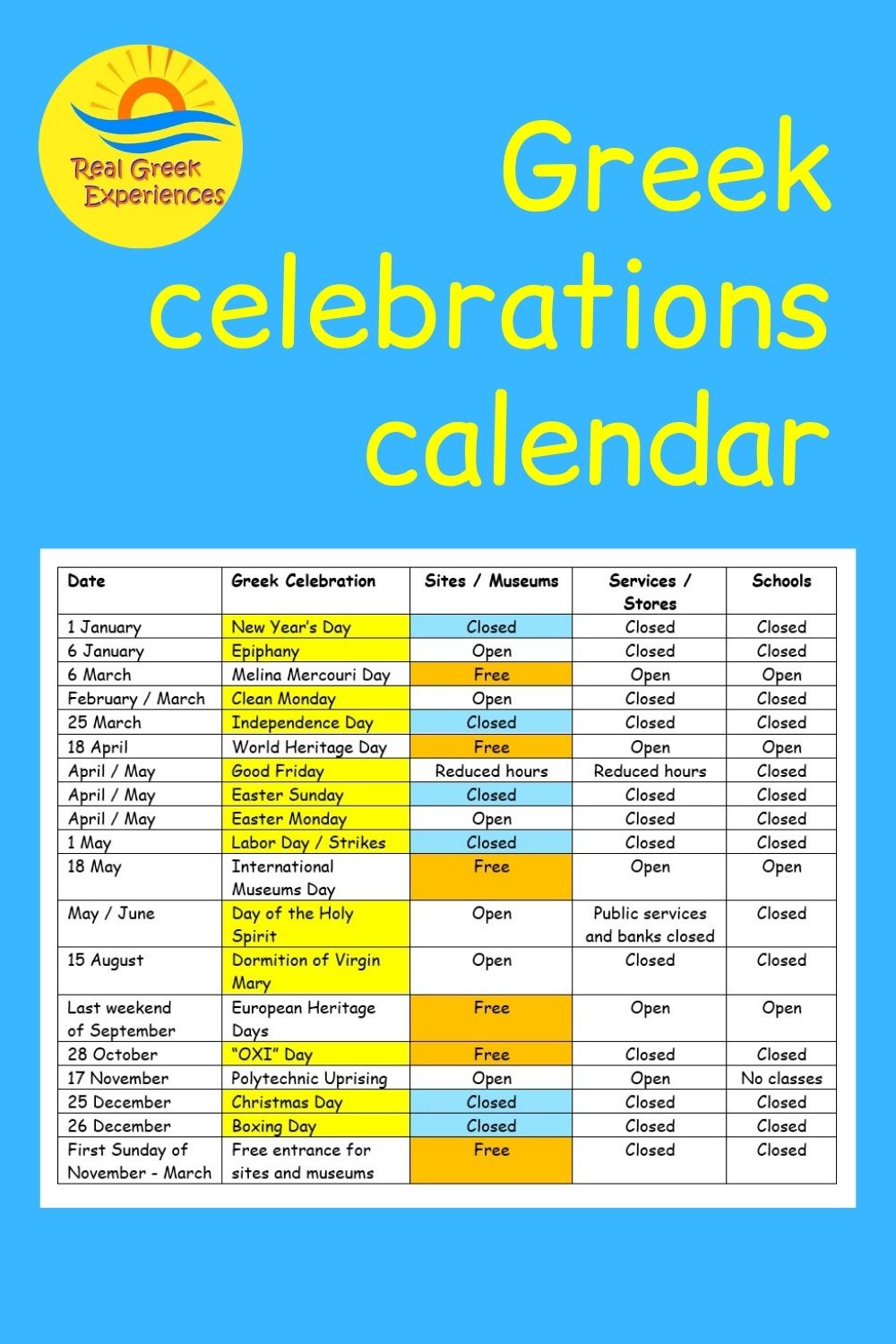
And before you go, check out these other articles:
- Useful words and phrases in Greek
- How to swear like a Greek
- Best things to do in Athens on a Sunday
- Free admission dates for the archaeological sites and museums in Greece
 Hi! I’m Vanessa from Athens. If you’ve experienced any of our celebrations, I’d love to know what you thought, so feel free to leave a comment below! Follow me on my social media:
Hi! I’m Vanessa from Athens. If you’ve experienced any of our celebrations, I’d love to know what you thought, so feel free to leave a comment below! Follow me on my social media:
- Facebook page and very active Facebook group
- Amazon

Amazing i really love it. The festivals show the culture of regions and also active our minds
I love Greece and l want to come there in the future l have a good expectation in Greece💖
instead of melomakaroni at Christmas, put any kourabies